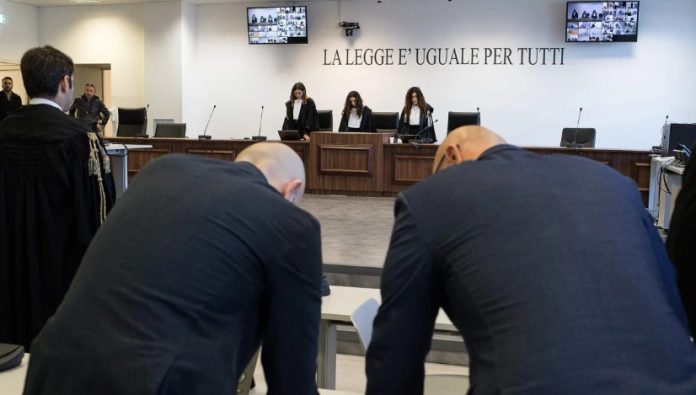An Italian court on Monday found 207 people guilty and sentenced them to 2,100 years in prison on charges of involvement in Italy’s ndrangheta syndicate, one of the world’s most powerful, extensive and wealthy drug trafficking groups.
According to prosecutors leading the investigation in southern Italy, the “ndrangheta” has been stealthily gaining strength in Italy and abroad as the Sicilian Mafia has lost its influence and now has a near monopoly on cocaine imports into Europe. Italian prosecutors note the organisation also has bases in North and South America and is active in Africa. In recent years, “ndrangheta” figures have been arrested throughout Europe, as well as in Lebanon and Brazil.
The defendants were charged with offences including drug and arms trafficking, extortion and association with the mafia. Others were charged with aiding and abetting the Ndrangheta without actual membership.
The charges stemmed from an investigation into the activities of 12 clans linked to a convicted “ndrangheta” ringleader. Luigi Mancuso, the main defendant in the case, served 19 years in an Italian prison for his role in running one of the most powerful “ndrangheta” crime families, based in the town of Vibo Valentia.
Vincenzo Capomolla, Catanzaro’s deputy chief prosecutor, said the convictions confirmed the big picture of the case and confirmed that the “ndrangheta” held power in Vibo Valentia. He noted:
“The infiltration of the criminal organization in the province of Vibo Valentia was so deep-rooted and so widespread, so alarming, so disturbing that I think it can be noted that there was no aspect of the life of the social economic fabric of the province that was not conditioned by the capacity of the force of intimidation of this so dangerous criminal organization.”
Giuseppe Di Renzo, a lawyer for several defendants, emphasised that more than a third of the original defendants had been fully acquitted, while others had been found not guilty on some charges.
He criticised the disparate and large number of defendants, saying they showed a lack of a cohesive thread in the prosecutors’ case. However, Nicola Gratteri, the former chief prosecutor of Catanzaro who launched the investigation, said that in mafia trials it is often necessary to cast a wide net because the very nature of the activities of crime syndicates is that they penetrate a wide section of society.
“Ndrangheta has been virtually immune to overturned evidence for decades, but the ranks of those who have overturned government evidence are growing larger. The current trial included a relative of Mancuso.
Several dozen informants in the case were from the “ndrangheta”, others were former members of the Sicilian Cosa Nostra. Despite the large number of defendants, the trial was not the largest in Italy involving alleged Mafiosi.
In 1986, 475 alleged members of the Sicilian Mafia were tried in a similar bunker in Palermo. It resulted in more than 300 convictions and 19 life sentences. The trial helped expose many of the brutal murder methods and strategies employed by the island’s top Mafia bosses, including the sensational murders that drenched the Palermo neighbourhood in blood during the years of power struggles.
In contrast, the ndrangheta trial sought convictions and sentences based on alleged acts of collusion between Mafiosi and local politicians, officials, businessmen and members of secret lodges to show how deeply entrenched the syndicate was in Calabria.
As the criminal investigation revealed, the “ndrangheta”, with the proceeds from the cocaine trade, took over hotels, restaurants, pharmacies, car dealerships and other businesses throughout Italy, particularly in Rome and the wealthy north of the country.
According to investigators, the buyout spread throughout Europe as the syndicate sought not only to launder illicit proceeds but also to make “clean” money by engaging in legitimate businesses, including those in the tourism and hospitality industries.
